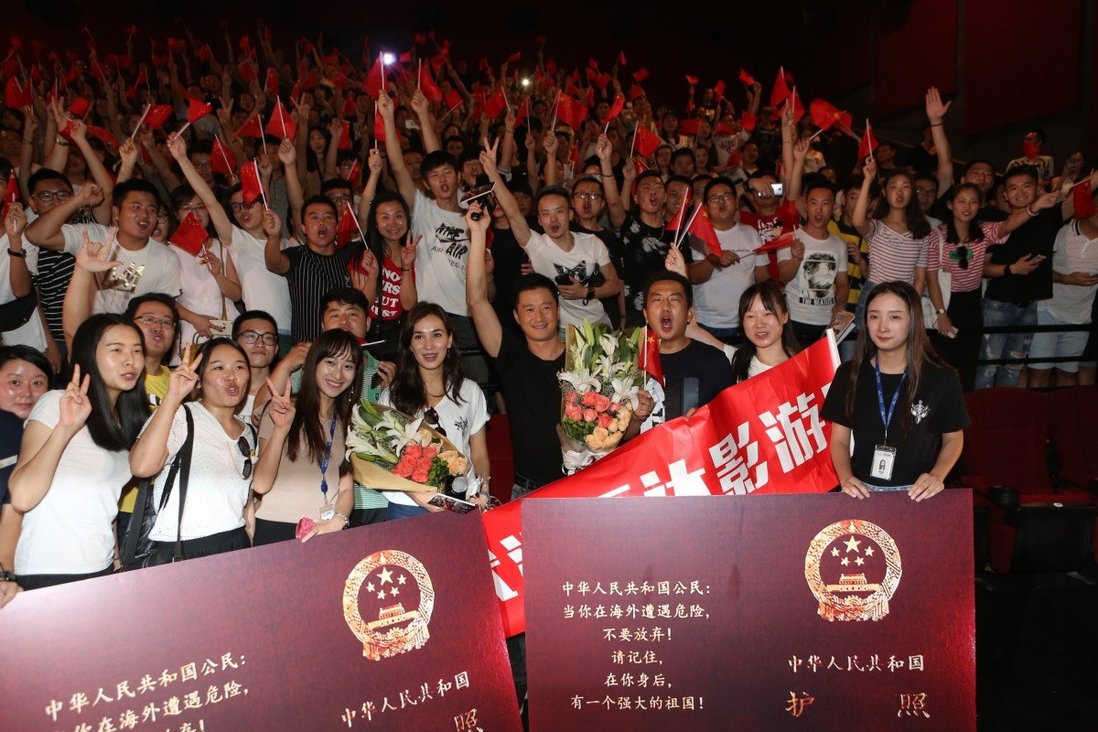www.aljazeerah.info
News, March 2020
Archives
Mission & Name
Conflict Terminology
Editorials
Gaza Holocaust
Gulf War
Isdood
Islam
News
News Photos
Opinion Editorials
US Foreign Policy (Dr. El-Najjar's Articles)
www.aljazeerah.info
|
Editorial Note: The following news reports are summaries from original sources. They may also include corrections of Arabic names and political terminology. Comments are in parentheses. |
China Must Watch for Signs of Rising Nationalism Spurred by Tensions with the West, Warns former Top Official
SCMP, March 10, 2021
 |
|
| Wu Jing, the story of the Wolf Warrior series, meets fans at an event to promote the nationalistic action movies, March 10, 2021 |
China must watch for signs of rising nationalism spurred by tensions with the West, warns former top official
He Yiting, former executive vice-president of the Central Party School, favours opening up China over fostering populism Chinese history professor says radical voices online only reinforced stereotypes in the US of a ‘red empire’
Wu Jing, the story of the Wolf Warrior series, meets fans at an event to promote the nationalistic action movies. Photo: Imaginechina
A former top official responsible for training Communist Party cadres has warned against the rise of domestic nationalism while tensions between China and major powers were rising.
“(China should) continue to expand opening-up, actively and prudently handle relations with major countries, and prevent the rise of domestic populism,” said He Yiting, former executive vice-president of the Central Party School, during discussions in the Chongqing delegation dated last Friday. He’s comment comes after r elations between Beijing and Washington deteriorated sharply during the Trump administration and nationalist sentiment has risen as China confronts the US, Europe, and other countries over issues such as Hong Kong, Xinjiang and the South China Sea. Chinese cartoonist Wuheqilin’s artwork commenting on the attack on the US Capitol building was posted on his Weibo social media account on January 10, 2021. Photo: Handout In January, thousands of Chinese social media users used the attack on the Capitol in Washington to attack failures in the US political system including the cartoonist Wuheqilin , a self-proclaimed Wolf Warrior, who published a work called Separation of powers – Thief Mob Murderer.
Last May, a proposed regulation to make it a little easier for foreigners to get permanent residency in China caused uproar online, with many Chinese expressing strong opposition to the move.
Other Chinese officials and academics have warned that the rise in nationalism could backfire both inside the nation and abroad. But it is rare for someone of He’s stature – a former senior official from the Central Party School, the top ideological indoctrination institution of the Communist Party – to issue such a caution.
He’s warning comes as perceptions of China are deteriorating internationally. A new survey by Pew Research Centre found nine in 10 Americans now viewed China as a competitor or enemy, rather than a partner, and most favoured putting pressure on Beijing over human rights and economic issues. Some 67 per cent of respondents reported feeling “cold” towards China this year, up from 46 per cent in 2018.
Zhu Lijia, a professor with the Chinese Academy of Governance, said domestic nationalism was on the rise as China faced challenges from other nations..
“Such indignant remarks add fuel to the fire and are detrimental to China as a big country moving towards the centre of world civilisation,” Zhu said. “The government should be cautious dealing with nationalism and try not to let it bring the relationship of China and other countries into a state of hostility.”
Xiao Gongqin, a history professor at Shanghai Normal University, wrote in November that the rise of nationalism in China had made people in the US see China as aggressive.
Xiao wrote that those sentiments would affect the judgment of American experts on China issues, and strengthen their stereotyped misconceptions that China had become a “red empire”, and further influence the American elite and civilians.
The Chinese government has always tried to prevent nationalist sentiment backfiring.
Ma Yusheng, deputy director of the party office handling issues affecting social and political stability, wrote in 2017 that authorities must stop sovereignty disputes from triggering mass protests.
“[We must] properly handle the relationship between people’s patriotism and social stability … identify, contain and deal with them as early as possible,” Ma said at the time.
A small number of protests broke out in 2016 after an international tribunal in The Hague ruled against China’s claims to much of the South China Sea. State media slammed the ruling as illegal and deemed it a conspiracy by the US and its allies.
But Zhang Ming, a political professor at Renmin University, said nationalism in China was controlled and there was no cause for concern.
“Don’t take the anti-American voices online too seriously. If the relationship improves, these voices will all disappear,” Zhang said.
***
Share the link of this article with your facebook friendsFair Use Notice
This site contains copyrighted material the
use of which has not always been specifically authorized by the copyright
owner. We are making such material available in our efforts to advance
understanding of environmental, political, human rights, economic,
democracy, scientific, and social justice issues, etc. We believe this
constitutes a 'fair use' of any such copyrighted material as provided for
in section 107 of the US Copyright Law. In accordance with Title 17 U.S.C.
Section 107, the material on this site is
distributed without profit to those
who have expressed a prior interest in receiving the included information
for research and educational purposes. For more information go to: http://www.law.cornell.edu/uscode/17/107.shtml.
If you wish to use copyrighted material from this site for purposes of
your own that go beyond 'fair use', you must obtain permission from the
copyright owner.
|
|
|
|
||
|
||||||


